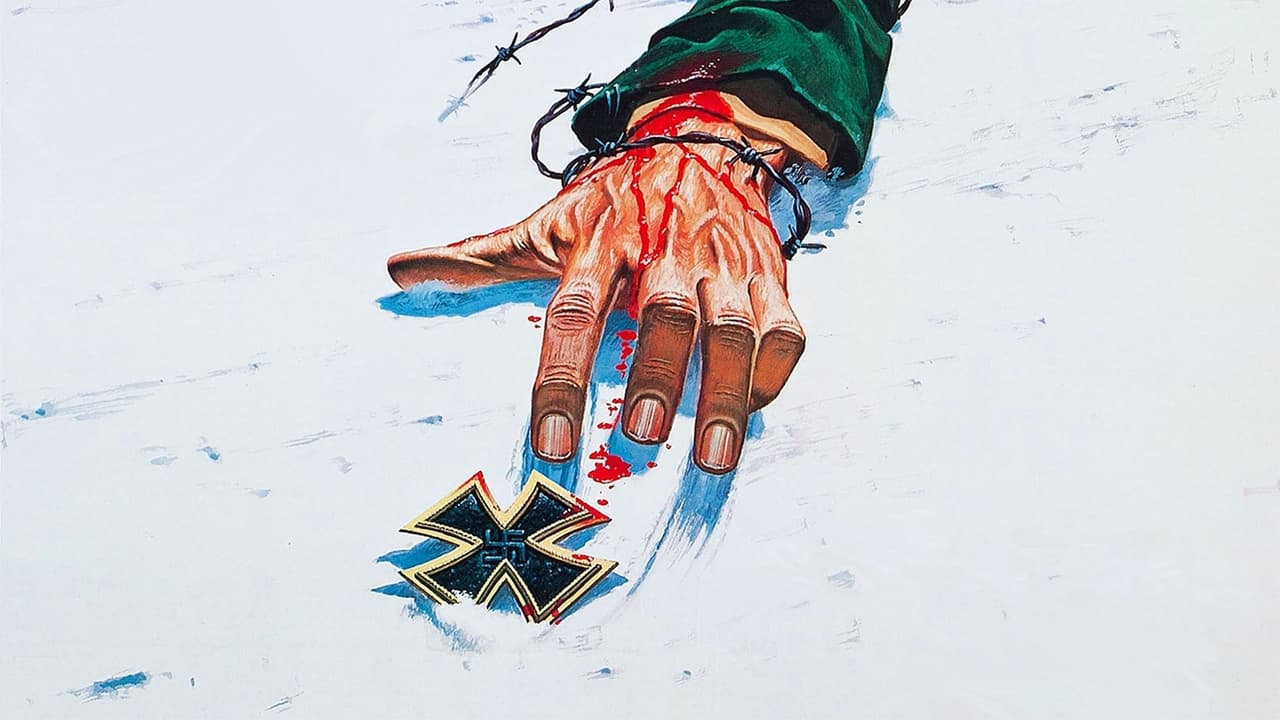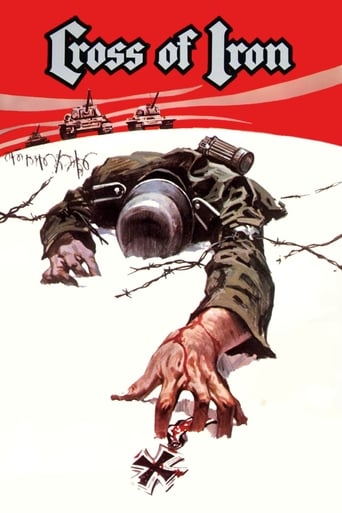

I have absolutely never seen anything like this movie before. You have to see this movie.
... View MoreThe plot isn't so bad, but the pace of storytelling is too slow which makes people bored. Certain moments are so obvious and unnecessary for the main plot. I would've fast-forwarded those moments if it was an online streaming. The ending looks like implying a sequel, not sure if this movie will get one
... View MoreGreat example of an old-fashioned, pure-at-heart escapist event movie that doesn't pretend to be anything that it's not and has boat loads of fun being its own ludicrous self.
... View MoreThere's a more than satisfactory amount of boom-boom in the movie's trim running time.
... View MoreVersion I saw: UK bluray releaseActors: 6/10Plot/script: 6/10Photography/visual style: 6/10Music/score: 7/10Overall: 6/10Sam Peckinpah was one of the most respected directors was one of the most respected American directors of his generation. He specialized in westerns such as The Wild Bunch (especially), and more generally went for adventure stories with a shade more subtlety than straight-up boys'-own swashbucklers.Late on in his career, he took on an interesting task in Cross of Iron: a Second World War film told from the perspective of the German soldiers. In any such film, there are a couple of elephants in the room: Nazism and defeat. While Nazism can be covered, and indeed has been covered in the past, from other perspectives such as the Allied soldiers, or German civilians, this point of view has the unique colouring that we know they are destined to lose. If any happy ending is to happen for the main characters (and it may well not), it will be contrasted with the fate of their fellow soldiers.In Cross of Iron, this is partly dealt with by isolating Sgt Steiner (James Coburn) and his squad behind enemy lines, and forcing them to make a daring trek through enemy territory. This cuts them off from the main pressures of the background, and allows the writers to bring them in on a controlled basis.The main conflict, apart from against the Soviet army, is between Steiner and Capt. Stransky (Maximilian Schell), a political commissar of sorts who, while he claims not to be a Nazi party member, enforces their ideology over Steiner's seemingly more noble, practical approach. The main underlying thrust of the film is an anti-war message, that those at the top do not understand the brutality of the front line, and so resort to armed conflict entirely too frivolously.When it comes down to it, though, the film is mainly a straight adventure, with very limited subtlety. The 'subtext' is even transformed into a supertext when it is spoken directly by Steiner: "I hate officers." It seems that, by his third-to-last film, Peckinpah had perfected his formula, enabling him to produce a strong, exciting adventure film with a bit of depth, without straying far from his comfort zone. However, he had also become somewhat set in his ways. There is a great deal of narrative and thematic potential in the central idea, I think, but Peckinpah had lost some of the flexibility to explore it.
... View MoreAttractive sensual Eva utters ''Long live Germany''.This is the best film depicting ordinary Germans fighting for regime that has no moral ground. ''Long live Germany'' are crucial words, crucial because many Germans fought for Germany and not for Adolf Hitler, although he changed the oath not for Germany but for himself personally. Miserable Bohemian corporal had the nerve to spit on German military tradition and patriotism and destroyed the moral ground of the people, country and army. That moral bankruptcy and corruption shapes the whole atmosphere of this great film, and strife for survival of ordinary troopers becomes deeply existential drama where the only thing they are fighting for are their lives, or, when officer caste member is in question, vague sense of duty and honor shaped into piece of metal called Cross of Iron.
... View MoreOur story begins on the punishing wasteland of the eastern front in 1943. The gallant but disillusioned Sgt. Steiner(James Coburn)has been awarded the coveted iron cross for bravery in combat. Steiner's new commanding officer Capt. Stransky(Maximillian Schell)a supercilious Prussian aristocrat, hungers for nothing more than personal glory and the chance to earn his own iron cross. It isn't long before a bitter contempt develops between the two men, as the jaded Steiner realises that Stransky is a dangerously deluded coward. With the red army pushing the Germans back, contempt turns to disgust after Stransky takes credit for the heroic actions of Steiner and his men and leaves them at the mercy of the Soviets.Steeped in deliciously morbid cynicism, Sam Peckinpah's only war movie captures military life on the hellish eastern front with unparalled skill. Deeply rooted in satire, never have I had the pleasure to enjoy an (anti)war movie so raw, so mesmerising, so flawless. The hauntingly dreamlike imagery does nothing short of dazzle and the poignant atmosphere of muddy trenches fills ones nostrils with the nauseating stench of war. As far as war movies go, Orson Welles said that Cross Of Iron was the greatest he had ever seen. I am inclined to agree, if it wasn't for stiff competition from classics like Patton, A Bridge Too Far or Attack!. The performances are nothing short of brilliant. James Coburn and Maximillian Schell dazzled in their portrays. The one and only James Mason was also on fine form as the war weary Colonel Brandt. A hoard of competent European talent also flex their acting muscles in supporting roles. With a flawless script, Cross Of Iron is just as much a study of class relations as it is a study of war. The battle of wits between the demoralised Steiner and the priggish Stransky is just as gripping as the physical battles between soldiers and tanks. Steiner is a man more loyal to his men than he is to his country. His only goal is to survive the carnage which surrounds him. Officers and medals mean nothing to him whatsoever, describing his iron cross as nothing more than "a worthless piece of metal". Stransky on the other hand, has his loyalties driven by an almost erotic obsession to win the iron cross. Like most members of the upper classes, he views war through rose tinted glasses, a trait which eventually leads to his undoing.The explosive but bizarre climax oozes with darkly comic humour. As a matter of fact, the entire movie does, although the black humour is at its greatest near the end of the movie. The film itself is a metaphor for insanity, with insanity shamelessly represented by the climax. The final 25 minutes make the writers seem as if they were high on crack, although the final sequence itself is just so beautiful in a darkly humorous, yet horrifying kind of way that it succeeds on every level!. Too amazing to spoil, no war movie you have ever seen or will see will end with a sting more piercing than Cross Of Iron. The movie boasts a handful of muscular battle scenes which see Peckinpah play his trump card. Anyone who has seen The Wild Bunch or Straw Dogs will know that I am talking about slow-motion!. The intercutting of slow-mo action with standard speed action heightens the tension here in a way more impressive than that of any other Peckinpah movie!. The camera techniques utilised include shakycam and tight close-ups. Monstrous explosions puncture the scenery as men brutally fight for their lives with the odd squib bursting(another Pekinpah speciality). I was also impressed to see real Soviet tanks put to terrifying use in a taut skirmish at a disused factory.Whilst totally surreal, Peckinpah's gorgeous nightmare will definitely leave a lasting bitter taste in your mouth. The lashes of black humour(which are occasionally hilarious in a cruel kind of way)and harrowing imagery will rock your world in one of the most severe portraits of war ever painted!. 10/10.
... View MoreIt's 1943 at the Russian front and the Germans are losing. Rolf Steiner (James Coburn) is a superior soldier and leader of men. Aristocratic Captain Stransky (Maximilian Schell) is the arrogant true-believer new commander. During a bloody battle, the brave Lieutenant Meyer dies leading a heroic counter attack while Steiner is injured and Stransky bumbles in his bunker. The ambitious Stransky claims the counter attack as his own and requests the Iron Cross giving Steiner and the homosexual Lieutenant Triebig as witnesses. After a stay in a hospital, Steiner returns to the front unexpectedly and refuses to lie for Stransky. The order comes to evacuate but Stransky deliberately leaves Steiner and his platoon behind.Director Sam Peckinpah brings alive the war action. The story behind the action is compelling but it is the action that is exceptional. Peckinpah lets loose with an orgy of muddy explosive violence. The war action is relentless. Coburn is terrific as the leader of men. There are memorable sections like the female Russian squad. This follows the great tradition of anti-war movie.
... View More